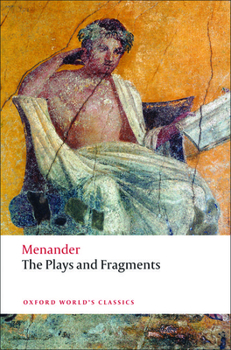The Plays and Fragments
Select Format
Select Condition 
Book Overview
The greatest writer of Greek New Comedy and the founding father of European comedy, Menander (c.341-290 BC) wrote over one hundred plays, of which only one complete play and substantial fragments of others survive. Until the twentieth century he was known to us only by short quotations in ancient authors. Since 1907 papyri found in the sand of Egypt have brought to light more and more fragments and in 1958 the papyrus text of a complete play was published,...
Format:Paperback
Language:English
ISBN:019954073X
ISBN13:9780199540730
Release Date:July 2008
Publisher:Oxford University Press
Length:352 Pages
Weight:0.60 lbs.
Dimensions:0.9" x 5.1" x 7.7"
Customer Reviews
4 ratings
Review of Oxford's Menander
Published by Thriftbooks.com User , 14 years ago
This volume is an excellent collection of all, or almost all, of the known Menander. It includes his sole whole play, Didoskolos, many fragmentary plays, and also many doxai and apocrypha. The translation is fine, but it it's rarely funny. I feel the fault lies with the fragmentary nature of the subject, not with the translator. So many of the fragmentary plays feel like a collection of characters related in some confusing manner (someone's always in love) and interacting to some unknown end. Humour is occasional, not consistent. Also, the notation is sparse and at the end of the book. I've read other translations of Greek comedy that take great care to point out puns and double-entendres in the original text. This collection does so rarely.
The Root of All Happy-Ending Art
Published by Thriftbooks.com User , 23 years ago
Whip through a couple of these short plays and fragments by the father of Greek New Comedy, and you'll see just how much our more modern formats are indebted to him: the American sit-com, the romantic comedy, etc. Menander manages much less simplistic resolution at the end of his plays, though, and it's too bad that this trend hasn't endured as well as the penchant for the "happily ever after" that we face at the close of every Julia Roberts movie.The plays themselves are marvelous. In "Old Cantankerous," the grumpy title character stands in the way of a love between two of the play's characters, until the plot sends him down a well. His rescuer is, of course, the man who wants the old curmudgeon's daughter's hand in marriage, and they make up and all's well. "The Girl from Samos" is funnier, with a baby mix-up that leads first to the normal questions of the father's identity, but then to far less normal questions about the mother's identity.Miller's introduction is exceptional, and I was especially appreciative of it, since I am not a classicist. She provides enough background to initiate even the casual reader, and in a manner that is both humorous and accessible. She explains what can be explained and accounted for, and freely admits to what is pure conjecture; since Menander's plays survive only in fragments, and since we don't know all of the concrete facts of his life, Miller's candor is welcome and helpful.The only thing I found off-putting was the translation. It is not only VERY contemporary, but VERY British. While I can understand the urge to place things in a more familiar setting--an easy way to remind people that great drama is always timely--some of the dialogue sounds lifted from "Chariots of Fire" or even "Goodbye Mr. Chips." That is, it sounds very early twentieth century British, and I spent a lot of time while reading trying to figure out why (I'm still stumped). Phrases such as "There's a good chap," and explicit references to "Picadilly Circus" just didn't seem to mesh with plays that are Greek and a couple thousand years old.Still, you could a lot worse than spend $12 on a fine collection and very readable rendition of some of the very foundations of comic form in Western literature.
Menander, Plays and Fragments
Published by Thriftbooks.com User , 24 years ago
I'm a Classical Civilisations student at Leeds University in England and this book is one of many that I have to read for my course. Menander was said to be "second only to Homer" and it is clear why this statement was made in this translation by Norma Miller. This book contains all but two of the fragments found of the ancient writer and as such is a marvel to read for anyone interested in classical drama. Old Cantankerous really stands out as a superb piece of literary work and could take pride of place on anyone's book shelf. Although some of his plays are fragmentary and are therefore not always complete, Menander's writing style is both gripping and humerous and keeps the reader enthrawled throughout their classical experience.
Menander's plays and fragments
Published by Thriftbooks.com User , 24 years ago
I'm a Classical Civilisations student at Leeds University in England and this book is one of many that I have to read for my course. Menander was said to be "second only to Homer" and it is clear why this statement was made in this translation by Norma Miller. This book contains all but two of the fragments found of Menander. Old Cantankerous really stands out as a superb piece of literary genius, although this isnt to say that the rest of the book isnt an equally great piece of work. This book contains fragments of Menander's work as this is all that has been found of this magnificent writers accomplishments, if you are interested in classical drama then this book is definetley worth considering.






